Kate Bowler: In every deep relationship, there comes a point where we are asked to give up something of ourselves or change in ways we never anticipated. Who will this make me? What will this love cost? My name is Kate Bowler and this is Everything Happens. Today’s conversation delves into how love pushes us beyond our comfort zone. And in my guests’ case, across continents, cultures and the boundaries of life and death. Tembi Locke ran into a gorgeous Italian chef named Saro when she was studying abroad in Italy during college. They fell in love over food and culture and art. Saro left Italy and moved to the United States so they could forge a life together, much to his very traditional Sicilian family’s disapproval. Eventually they won his family over, but not without a ton of work. Their romance was a story for the big screen. And I mean that quite literally, you can go watch that movie, I think quite literally. But a rare illness upended it all. Tembi spent ten years a Saro’ss caregiver, before he died. And in her grief, Tembi took their young daughter back to Sicily to see what of her husband she could find there. In his culture, in his food and with his family. Tembi wrote about their love and her grief and the healing she found at her mother in law’s table in her gorgeous bestselling book, From Scratch. It was also turned into a Netflix series starring Zoe Saldana. And you really have to watch it and you have to read it and then you have to watch it and read it again. It is all so beautiful, and I have always wanted to meet her, so I am so excited to be with her today. Tembi. Hello.
Tembi Locke: Kate. I feel likewise. And so I feel just truly grateful, I want to name it, grateful. Honored. Joyous.
Kate: That’s so nice. I’ve loved getting ready to be with you because every layer of your story feels like it’s a truth we’re trying to learn to live. So I wondered if we could start with baby Tembi.
Tembi: Sure. Let’s do it.
Kate: That’s sweet, baby 18 year old looking out at the world expectations for what you thought maybe your life might be like.
Tembi: Yeah. Well, thank you for inviting her into the room, because that 18 year old me is really a version of the eight year old me who, like, looked out the window. I grew up in Houston, Texas, to parents who were super hard working. Definitely, you know, boomers trying to just like get food on the table, latchkey, daycares, all the things. And I remember so many rides home after school or after daycare where I’d look out the window and I just thought, what else is out there in the world? And so I was always just being super curious about that. And then when I got to be 18 and I’m in college, you know, the world is telling you to some degree like you’re an adult now, you can make your decisions. And so I was leaned into it. And for me, what that looked like was I want to study art history, random. And the pursuit or the interest in the art history is what then led to Italy. And that’s where things get really interesting.
Kate: There’s a funny feeling, and I wish we could just bottle it, but it’s the feeling that you look at the world and you think like, I could eat you up. When you talk about Italy, there’s a combination of feeling some of that, like young Ferrari feeling where you’re like, I have no limits.
Tembi: I certainly didn’t.
Kate: But then like, it’s so, it must have just been so overwhelmingly everything, like beautiful, delicious, different.
Tembi: For me, and I can certainly see now I know about myself because I am so experiential and tactile and sensorial in a certain way that Italy was a landing spot for me to plug into all those parts of me. But I think for many people you could substitute Italy for, you know, it doesn’t have to be Italy for everyone. Everyone can have a place that activates a fullness of life and being and and excitement and curiosity and and a voraciousness for life. And for me, it just, it happened to be Italy. And then I kind of was off to the races.
Kate: Oh my gosh. I like that so much. Did falling in love then feel like being fully enveloped into the new world through the eyes of this gorgeous man?
Tembi: Yes. And some of it is that two things were happening simultaneously. There was, he then became kind of, you know, the docent.
Kate: The docent.
Tembi: Right. He was like walking me through it in like, you know, translating what I’m seeing and why it’s this. And he would tolerate every question I had.
Kate: First, describe him.
Tembi: And, you know, for listeners who will soon know from this conversation or who’ve read the book or my late husband Saro, and I love to say his name because it’s inviting his energy in the room, and, you know, he’s very much alive in my heart. But he was, you know, handsome and kind. He was conversant in five languages. He loved poetry and politics as much as he loved, like a perfect artichoke. You know? And he liked, he loved nature. And he loved people. He loved how people moved the world and thought about the world. And so I think when we met, he clearly saw something in me. Meaning, he was like, this girl, and I was a girl, I had literally just turned 20, which is not fully in your womanness. I wasn’t yet, but I think he was very curious about how I had come to be in Florence. And we met by chance and I didn’t fall head over heels immediately. But he had a kind and quality of love and patience that set us on the path of a great friendship that then evolved into this, you know, the hot, steamy, everything you would imagine in an Italian chef man who loves poetry and, you know, that kind of stuff. So I think your question about him opening me up to Italy, so that was happening, but in tandem with that, or more importantly than that, he was opening me up to love and to a way of living life fully taking everything in.
Kate: What a saver.
Tembi: He was. He was lived. He was informal, but he was ever present. And it was kind of like how he was just hard wired. So lucky me that the one person I bump into in Italy on a street corner is this person.
Kate: Yes. Who’s so attentive in his love.
Tembi: Yes. And he then inducted me into that.
Kate: And you add to that, it seems like this willingness to sacrifice early.
Tembi: Yes.
Kate: Like you need to go back to the States. Okay? They have food.
Tembi: Oh yeah, they have food, I’m going with you. But even, you know, there was that sort of, like, clarity of like, I will make this work under any circumstances. You know, after my time in Italy as an exchange student, I went back to school, graduated, and then it became about him coming, and joining in the States into kind of a life and a dream that I had at that point of being an actor. Which is also incredibly improbable.
Kate: Right. Right. You’re like, this is not, weirdly not a story about risk assessment. Yeah.
Tembi: No, it’s not. Because it meant unraveling his life at 32. To leave a country that he lived in, was born in, to come to America. To basically start at zero. And I’m the one person you know.
Kate: And for people who say this might be a difficult thought for not us, but sometimes it’s not that amazing to move to America. Sometimes other people’s countries are great, and it would have been easier for them to be there and it would have been lovely.
Tembi: Oh it would have been absolutely easier for him to live there. But I think there was something in him also that was like, he was curious about what a life in America might look like.And he felt a kind of possibility like, what’s happening over there? This this place that created the blues, this place that did the corndog.
Kate: The corn dog! I do remember seeing a corn dog for the first time. I was an adult woman.
Tembi: I mean, think about that. I mean, I think that’s the thing that international people are always curious about, about the American psyche, is this. It’s both random and curious, but kind of innovative and exciting. And I think in some ways he had, you know, he’d read enough American literature, he’d studied at University, English. He wanted to be a translator. So he had read a lot of American literature and I think was very much fascinated with this place that had everything from the Great Plains to like, you know, dense cities and could create music that was, you know, very, very full and diverse. So.,Coming along with me would give him a front seat to that.
Kate: Yeah. We’re going to be right back after a break to hear from our sponsors. Don’t go anywhere. Sometimes when I think about those building stages of life where like two people are trying to make a life together, especially at a certain stage and there’s a certain amount of suffering like that is very gluey, like, like. And then you look back and then you get weirdly nostalgic about, like, the right dosage of suffering that you’re like, my gosh.
Tembi: We’re in these trenches together and we both are kind of like aspiring to something that’s outside of these trenches, you know, and it more or less looks the same. We don’t know enough yet about life to know all the stuff that’s going to come our way. We don’t really know it yet. I think the both of us, we had that. We were in the trenches. We definitely had the futon on the sublet. We sublet an apartment in L.A. at a certain point that had a parking spot with a pole, and I kept hitting the pole. And I remember just flat tires and hitting the pole.
Kate: Yeah.
Like I couldn’t get in and out of the parking, you know, and we had, like, no money. And it was like riding the bus and figuring out L.A. with one car and the futon and coupons. But we do it. Because we’re moving towards something. We don’t know what it is, but damn, if it’s not going to have a lot of promise to it. Like earlier you asked me, like 18 year old Tembi looking out the window. I think I sort of knew that I had to be the architect of my own life insofar as no one in my family had lived the exact kind of life that I wanted to live. So I knew to some degree I was going to foundationally have to build it up. And I didn’t know what that would look like. I didn’t know what the tools were that I would need to build that house of the life that I wanted. But I knew that I couldn’t do that just looking at the examples that were already within my family. That the things that I could take from them were the values, the connectedness, the stick-to-it-iveness, the sense of hope and optimism. But they were teachers, lawyers, business people. And to some degree, they had constructed their own lives out o. The Jim Crow South, out of, you know, working class to maybe slightly more middle class. So they had done construction, right? But I was looking to construct a life of the arts and of pictures and painting and colors and feeling. What did that look like? A life of feeling? And so he came along with that, that vision. And there we were, like you said, I was like 23, 24 by the time he came to the States. And he’s mid-thirties. And I’m in very much quarterlife. And to some degree, he kind of was too, even though he was in his 30s, because he was starting over. So in all the optimism and on the futon, with all the dreams of what could be if we wanted to be, there was a shadow. And the shadow in our relationship at that time was the fact that his parents did not approve of our union. So he came to the relationship with a fractured father-son relationship. He, too, wanted to be, lead a life of the mind, cook food, do all these things that his dad, who was a farmer in Sicily who had very limited education and who really wanted his son to follow in his steps, could not wrap his mind around the choices that Saro had made long before Saro met me. Long before he met me. So that when we announced that we were getting married, his father summarily said, I have no son. I think it was easier for him to exile, to push out, to just say no than to, you know, accept what he perceived would be a hurt by allowing this in in what he said would fail. He thought it was predestined to fail. We were too different for it to work. Two different languages, two different families. My people were divorced. I wasn’t Catholic. It was all the things that were separate and unfamiliar. And so now I’m seeing really firsthand, I think I was sort of like poking at this bear of like, well, they’ll eventually come to the wedding. Like they’ll get over this and they’ll come.
Kate: Especially if you do it in Italy.
Tembi: In Italy. Oh yeah, we’ll bring it. We’ll do it right there in their country. They will come. Well they didn’t, news to me then. That was really like, this is different. This is deeper than I could have imagined. And but really, more importantly than me, bigger than me is I had to look and say, what is happening to him and what is this costing him and what will this cost our love and our relationship and going forward? And I could only turn my gaze away from that for so long before it really became clear that in order for us to be fully seen in our marriage, for me to fully see him and for the pain that he was carrying, the silent pain, I had to at least know them or go to his place of origin, which was Sicily. All of our Italian, my Italian experience had primarily been in Florence, where we met and fallen in love. But he was from Sicily. Two really different places. And so I poked and I said, we need to go there. And if they say no, if they meet me. We just need to get them to meet me. And eventually, if it’s really not in the cards then cool, but I know, and I did my part. Then I can put my head on the pillow at night.
Kate: It will be 100% complete by the time you are going to put your head on that pillow.
Tembi: I think so.
Kate: It sounded like that level of persistence made some, had some real early disappointments and then made some surprising gains.
Tembi: Yes, it did. And the surprise gain is that I developed a relationship with his family. What I saw was my partner gain a part of his life back. And damn if he wasn’t fuller, more present, more alive as a human. And then as a consequence, as my partner, as my lover, as my friend, he had more life. And damn if that wasn’t good for everybody. And so did his parents, by the way. So net net. Whoa, this is good. And I thought, well, good. That’s our story. Like, we just had our big obstacle. I just got Sicilians to like, except a black American with divorced parents who wants to be an actress. I did it. Pat me on the back. That was my hard tale that I will tell over a glass of wine at dinner. And I thought my that was my story, girl. Girl, I thought that was my story. I had no clue it was about to get real different. It was about to get real. It was about to get real.
Kate: It said.
Tembi: We’ll just cut to the chase. He was diagnosed with a very rare sarcoma. A leiomyosarcoma. And it presented in his, in and around the area of his knee. And I’m 31 at this point. And I have a husband who now has an incurable rare cancer. And also because of where it was located in his body, he now could not work anymore. So the dream that he had.
Kate: He had so many almosts
Tembi: He had so many almosts.
Kate: Almost are really painful.
Tembi: Oh yeah. And I didn’t know sometimes if the grief of the cancer or the grief of the almosts were the thing that weighed on him the most. And I’ve never articulated it in this way, but I think so much of his bedside living when he was going through chemo, his saying Tembi, you go do it, you go do it, was him yes being a wonderful husband who is trying to support his wife. But it was also like, I can’t, so do it for both of us. So his diagnosis came fast, hard, quick, deep. It was like, you know, in my recollection, it may have been a Thursday, but let’s just say it was like a Thursday, friday. It was like, you need to bank your sperm tomorrow because you’re going to start chemo on Monday. We’re going to put a port in over the weekend. And I was like, wait, what? I didn’t know any of these words. I didn’t know. What are we talking about? And so we just were in a kind of a-
Kate: You were in an avalanche.
Tembi: Yeah. And also in a fugue state, but also highly functioning. It was all the things.
Kate: I mean, it really will always look like a very organized woman is suddenly speaking a new language to doctors and has a calendar out and is incredibly polite. The fog of war looks exactly like that
Tembi: That’s exactly, it was the fog of war. And my sister, who is you know, she’s one of my people in the world, Attica. She is a writer. And she said, well. You’re not going to remember any of this. I’m coming with you. And she was our scribe. At least for the first, I know the first, like 3 or 4 meetings.
Kate: That narrator role is a precious, like exoskeleton.
Tembi: Yes. God bless her for the presence of mind to do that.
Kate: I don’t really know how grief works. I don’t. I just know that it seems to work differently as you’re trying to figure out which parts to give up and which parts to kind of pull back. And I find the push pull between those things to be one of the most difficult kinds of wisdom that I almost only sometimes have. Like, when do you just fucking gun it? Like when you have to go into that like, softer space of acceptance and cherishing and you had like ten years of that.
Tembi: Ten years. Ten years. I was his primary caregiver for ten years. And I was the sole breadwinner and we became parents during that time. And I was still trying to be an actress. So I was gunning it and I think what I now know about myself is that I gun it until collapse. And in the collapse comes the reflection that then galvanizes me to go back into the-
Kate: So this is a very dead sprint. Like what this looks is like someone passing out who is actually just immediately regaining strength. And then run at dead tilt.
Tembi: And I had other people in my life over that decade who were also caretakers to me who would tap me on the shoulder or who might collectively, like all gather around a campfire and go, she probably should have, what can’t she, what can we get? And they did all that. And then they would elect one of them to come and tap me on the shoulder.
Kate: The ambassador.
Tembi: To be like okay, we’ve decided and we’ve taken all the decision points away, which means it’s already booked. You will go, somebody’s picking you up. And they had to do that with me. Because the other thing that happened for me as a caregiver was I, and it’s very common, I felt as the caregiver, I had to be there every second because if I didn’t then it would all fall apart. Now, some of that I came to caregiving because I had had a childhood where I tried to always be hyper vigilant and hold things together. But some of it was I would look into his eyes and I thought, I can’t leave him alone. Can’t leave him alone.
Kate: Oh, lovey.
Tembi: I mean, I’ll tell you something funny he said to me in hospice. Two, three days before his passing, he looked up. He looked around the room. There was a hospice nurse. A friend had stopped by. Someone else was playing the guitar. My parents were there. Our daughter was there. And a few people left the room and he said, come sit. I sat next to him and he said, I think you’ve overbooked. I think you’ve overbooked. Because in some, in some sense, he knew. He intuitively, spiritually, his body knew, he was taking a solo journey. And he could also see the part of me that I knew I needed all that stuff around me to not feel alone, but that I was telling him I was doing it for him, when in part, I was doing it for me and he was like, if you’re doing it for me, I think you’ve overbooked. But if you’re doing it for you, I cosign. Bring the guitarist back in.
Kate: Genius.
Tembi: But that level, so he was my person because only my person could talk to me that clearly. And what he was really saying in that comment was it’s okay for it just to be the two of us. And then it gave me permission to be like, oh God, I don’t have to work so hard to also make hospice perfect. It’s his way of saying take a breath. We’re going to do this together. That’s the copaciousness. That’s the lovingness that I’d seen in Florence when I was 20 years old, back then, that was another version of it at a whole different season of our lives. And in fact, the final season of his life.
Kate: Yeah. When you really clearly describe all the differentways of loving that required very different resources and skills and identities like, you know, lover friend and then caregiver and you’re caregiver plus parent. I’ve known a few friends who’ve had children, adopted children. There’s such a desire, there’s just such an intense desire for life to like be, to be fully in love with everything you’ve had and everything you will still have, and with the world and with whatever you have, you want to also give.
Tembi: Here’s the secret that I don’t have to tell you, but I’ll say it anyway. We are living fully until we are not. And so if we’re fully here, then I’ll be damned if we don’t just lean all the way in.
Kate: That’s good.
Tembi: And that’s, you know. So, I needed the blessing of a doctor or a person in a white coat with a professor who said, you are clear to go be parents. Thank you, doctor. Because I did need that. I don’t know. I think I would have been like, equivocating a little bit. Maybe I should. Maybe I shouldn’t. But he was like, no go live your life. Let me worry about your cancer. Go be parents. If that’s what you want to do, go do it.
Kate: To try to let your fear not outpace your life.
Tembi: Geez, Louise. It’s a tug and pull. And I now say that the fear is a confirmation of the life. Meaning I’m so afraid, because I want to live so fully. That’s why I’m afraid. And so to give in to the fear would be to submit to the not living. So I guess I’m doing the thing that I’m scared of doing, but I’m going to do it.
Kate: That’s so much better than just saying like, oh I feel anxiety as if the bad feeling is like the pathological as opposed to just the sign that says, you’re moving in such a good direction.
Tembi: You’re moving and such a good direction. And certainly on the other side of ten years of caregiving, being a parent and losing my husband, I was like, well, I’ve seen how this all ends. So there’s not a lot that I’m afraid of. I mean, there’s things that scare me, but there’s not a lot that will paralyze me into not living, as I say now for the both of us. You know, I today, as I sit here with you, yesterday was Saro’s birthday. I am now, every day that I have now, I’m living past the age he was when he passed. So I know I’m seeing the world that he never got to see. So I go, like I’m into my, I’m into my 50s now. Like, he didn’t really get to do a lot of that. What’s that? So I’m doing it for both of us. And sometimes that, just knowing that, gives me enough permission to go do the thing I’m scared to do because I’m like, well, I’m now galvanized around that the purpose, the purity of purpose of living. For the love that we had, the love I had for him. And that I can share that.
Kate: Yeah. We’re going to take a quick break to tell you about the sponsors of this show. We’ll be right back. When you go through such a tragic loss, the retraction impulse, like the cocooning then, that normally lasts like a decade sometimes for the rest of some people’s lives.
Tembi: Sure, yes. Complicated grief.
Kate: Your decision to bring you and your daughter back to Saro’s family and love in a different way, be a family in a different way, is one of the most, like, costly stories I can imagine. Because if you’re, I mean, I just picture like you’re in a horrifying state of anguish. You’re on an uncomfortable bed back in a foreign land where you don’t get to be in charge of anything. I would imagine you want control, and I’m sure you did.
Tembi: Absolutely I did. But one of the things you learn when you get to Sicily that I will tell you, is it’s God’s will. Well, here we are. Let’s see what today brings. There’s a kind of surrender to the day-to-day. They. There is this sense of, and particularly if you’re also a farmer, and Saro’s family came from agrarians, so you understand you’re living in concstant land and it’s seasonal and it might rain or it might not rain or locusts might come through, or not come through. So therefore we do what we can do, but we do live at the edge of surrender always. Now, what we do in response to that is to like lean in or do we double down and get hard with whatever that is, but going to Sicily, you asked about the choice to go to Sicily. One was strangely, if felt like in my grief it felt like the most logical, like emotionally logical thing to do in a certain sense because I knew I could get closer to him. I felt like I would have a piece of Saro back if I went there. Now, in going back there, in having a piece of him, what would come with that was also the deep, deep grief and uncertainty and like, could I make family with his mother? Could we still be a family? Did she really love me? Or had I only been there as the companion to her son? And now that her son was gone, like, well, okay to her. Who cares? But selfishly, for me, grief wise, I wanted to see baby pictures of him. I wanted to like eat the food at the hand of the woman who birthed him and raised him and taught him how to cook like that would get me closer to him. So it was a combo platter of complex and contradictory motivations which led me there. And every moment I was there I was asking, why the fuck am I here? I need to get out of here. This was dumb. This was dumb. And then there’d be like a moment of grace where’d I’d be like, wow, I know I am here.
Kate: The small resentments that accumulate over living in somebody else’s world, I really wanted to ask, how did you manage the like, the pettiness that happens?
Tembi: I mean, like. Yeah, humor.
Kate: Like giant eye rolls and long walks?
Tembi: 100%. I took long walks. I journaled extensively. I had to write it down because I had no one to talk to. I couldn’t talk to my seven year old kid. She was a child. Yeah. I couldn’t talk to my mother in law. We were in it all together. There was no one else in town. And I remember she tried to buddy me up with, partner me up with another widow in town who was young, whose husband had died of a sudden aneurysm in their living room.
Kate: Okay.
Tembi: This is so Sicilian. You are young widow. You go talk to other young widow. And come back before dinner. And so and by the way, the obligatory, like if you’re mother in law in a small town, says, I’ve made an appointment for you across town to go talk to the other widow, you’re not going to be like, I’m not going. So I went and I remember we sat there, this woman and I, she probably was like, why are you? We both were like, why are we here? And we just sat over espresso and we talked a little bit about our spouses, but mostly about raising kids and what we were trying to do for our children in the absence of their fathers. And I felt like even though I resented having been sent to go talk to this widow, there was wisdom in it because my mother in law was like speed dating me.
Kate: The heavy handedness.
Oh, It’s beautiful. It’s blunt force, and it’s good. And it’s like there’s no nuance to it. It’s just like the she has dead husband. You have dead husband. Go talk immediately and don’t come back until dinner. But it worked. And, you know, we connected like, you know. I think for like subsequent summers, this woman’s parents and my mother in law preordained the date for us. So each summer, just before the town feast, we would meet up and we would have our obligatory coffee. We would check in. I’d hear about how her year had gone with her son. I would say how my year had gone with my daughter. We didn’t text. We didn’t get on WhatsApp with each other. We didn’t seek each other out. And it was like, well, the elders in town told us we’re supposed to talk. So we talked.
Kate: Being a care, I think this is from, Thomas Lynch is this amazing mortician poet who I’m obsessed with, and he talks about these roles that we end up playing, like especially in smaller towns. And he’s like, we, we, we, like, make fun of them or we love them or we hate them, and we’re like, old Joan, whatever. And then we become them. And the feeling of playing your part and being put in a part is so awkward. And yet it can be, it can have a real satisfaction to it.
Tembi: Yes. Because you feel of use. She was trying in her own way to help me. She had limited language resources. She never left her town. She did not drive. She didn’t wear pants. She’d never been to a movie theater. Once in her life, she was in an elevator and she’d never been on an escalator. What she could do was make an appointment three streets away from me to talk to another widow. And she did. And she felt useful because she thought maybe she’ll get something out of it that helps her when she goes back to that big city in America called Los Angeles. And I know she’s living alone, in a house alone, on a street where she’s not friends with her neighbors. I mean, not that I’m unfriendly with them, but I’m not, we don’t have the same community in a big city compared to a small Sicilian town where everybody’s having coffee together on the same street and they’re giving vegetables back and forth. It’s just a whole, we don’t do that in America in the same way, right? She was trying to give me the things she could give me. That was her role. She felt it was also her role as the mother of her, you know, son’s widow. She wanted to do it for her granddaughter. So she was like, I can make you food every day. I can do your laundry. I can listen. I can make you coffee. We can cry together. I’ll tell you when to stop crying, which she did.
Kate: She did?
100%. She was like, now enough. Now enough. Some of it was her own boundary setting. Like, I can’t take anymore. Can we stop, please? And some of it was, and we need to think about life. So let’s not overindex in just the sadness, which is a strange thing that you think like an old Sicilian woman would say. But she had enough lived experience to know you got to have the balance. You know, and she was one of the people who taught me, like, after every good cry. Go look at the sun. Go take a walk. Like, mix it up. Balance it out. She also was like, do not go out of the house with a wet head.
Kate: Stop.
Tembi: Do not let the wind hit your neck at 5:00 because you will get a stiff neck and then you’ll be in bed for two weeks. So she had lots of wisdom.
Kate: For people who are struggling with, they’ve lost something and they can’t get it back. And there’s just missing pieces everywhere, to have advice around like trying to make more of what you have.
Tembi: A think some of how I’ve come to that is I think there is something in me, innate perhaps, which is always seeking wholeness, which sounds like a big thing, but I’m always trying to seek of a kind of a fullness, right? And another part of it is that I am very curious about the missing thing. And I think that the way to acknowledge the missing thing is actually to run my fingers over the empty space. And in doing that, eventually with time, I start to feel like what might feel honoring or nice in its place. It’s like the flower that comes up through the crack. Something is trying to find its way through. And I think I’ve just accepted, and maybe illness taught me that, maybe Saro taught me that, maybe grief has taught me that, that missing thing is not going to not be missing. It’s got to stay missing. But let’s just start there. Me avoiding it isn’t going to change that fact. You know, I’ve had to talk about I had to tell the story, and as part of writing the book was I had to tell the story even to myself, to acknowledge the missing piece. I had to tell the story of Saro and I to acknowledge, on a different level, his goneness and also his presence. And so I don’t know, I don’t know if this is answering your questioning, i it’s not an easy answer because the answer is I go toward the missing thing.
Kate: Yeah. And it sounds like that’s the answer to the second part of the question was like, how do you make new things?
Tembi: You know, one of the big questions I had after his passing was like, well, how do I keep his, you know, which a lot of parents, a lot of grieving parents have, how do I keep the life of the other parent alive for the child? And just that question, which meant I had to lean into the missing. And then stand in it and then ask questions like, what does she need? What do I need? What would this look like? And answers would emerge like, okay, well, we’ll bring balloons to the gravesite. You know, we did a picnic this year and we played music, we played his playlist and we did a picnic. But I could only do that because I went into the emptiness and said, okay, well, what would feel good for her? We talk about it a little bit. It’s very imprecise. It’s very like life.
Kate: Yeah. When you were describing that, I was picturing like, you don’t salt the earth, you just like, seed it, you know, you just keep, some things will grow, some things won’t but like something new needs to grow too.
Yeah. And then you, realy, eally with your full to the bone gratitude, stand in honor and joy of the thing that does show up.
Kate: Yeah. Yeah.
Tembi: And I go, thank you for that bit of light.
Kate: Tembi.
Tembi: Kate.
Kate: I adore you. Thank you for this conversation.
Tembi: Oh my gosh. Oh my gosh. Thank you. What an honor. What an honor. I have looked forward to this moment for quite some time.
Kate: Tembi reminds us that love is a legacy. Even when the people we love are no longer physically present, their impact remains deeply woven into the fabric of our lives. Sometimes we may need to remind ourselves through familiar sounds or smells or tastes, love and grief are sensorial too. Like remembering grandma every time you bake her cookie recipe. Or the smell of patchouli that reminds you of your dad. Or for me, a butterscotch aftershave that my grandpa always wore. So I wondered, has there been a moment when a loved one, now gone, still felt deeply present in your life? We would love to hear your experiences of keeping someone’s memory alive. Write me online. I’m @katecbowler.,Or leave us a voicemail at (919) 322-8731. Love has a way of transcending time and space. So here’s a blessing for all of you who are remembering your person today. Blessed are you who feel the wound a fresh loss or of the loss, no matter how fresh, that still makes your voice crack after all these years. You who feel the ache, the stories that will never be told, and an anger rising when you remember what never should have been. All that they have missed and will miss. Worst of all, it is so beautiful the way this grief is a language of love. I am lovesick with this much sorrow. Teach me to speak this new mother tongue. Show me how to memorize so I can never forget what they gave and what is gone. And what we were owed by a world robbed of their presence. And simultaneously remind me of the fullness of life that is here, still, to be had to be enjoyed, to be savored in honor of the ones we miss.
Kate: All right, my darlings. A massive thank you to my team and our partners for all the work that they do that they put into this episode. Lilly Endowment, the Duke Endowment, Duke Divinity School support all of our projects. This podcast is also my very favorite thing that I do with people. And those people are the lovely Jess Ritchie, Harriet Putnam, Keith Weston, Baiz Hoen, Gwen Heginbotham, Brenda Thompson, Iris Greene, Hailie Durrett, Anne Herring, Hope Anderson, Kristen Balzer, Eli Azanio and Katherine Smith. I adore you. You are not going to want to miss next week’s conversation. I sat down with Charles Spencer. He is the ninth Earl Spencer, which might sound familiar because he is the late Princess Diana’s little brother. He wrote a brave memoir about his time in an abusive English boarding school as a child, and you are going to be so moved by his open heartedness and vulnerability. So I’ll talk to you next week, my loves, this is Everything Happens with me, Kate Bowler.
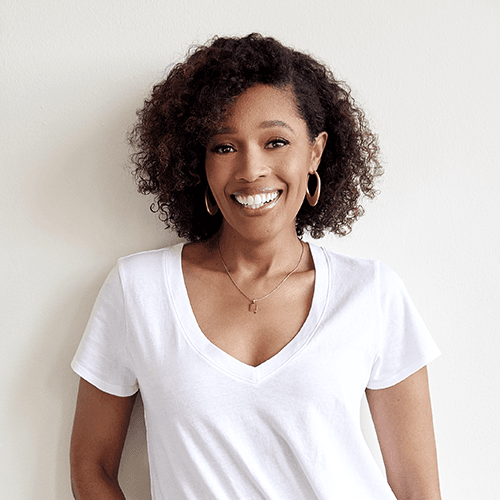

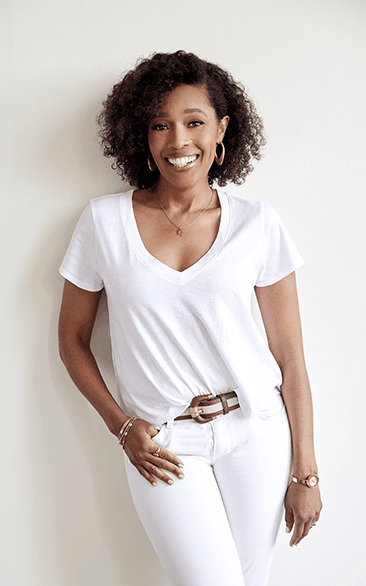
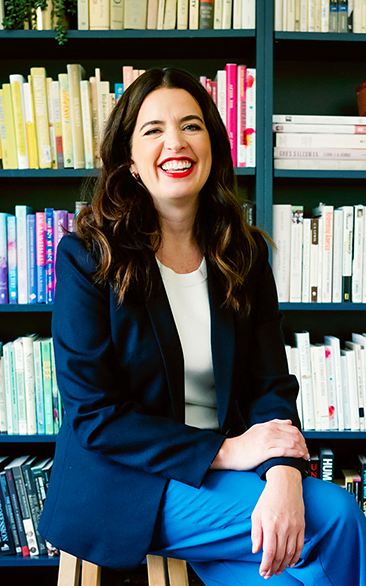








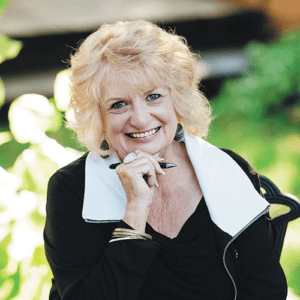

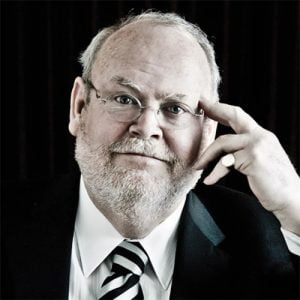
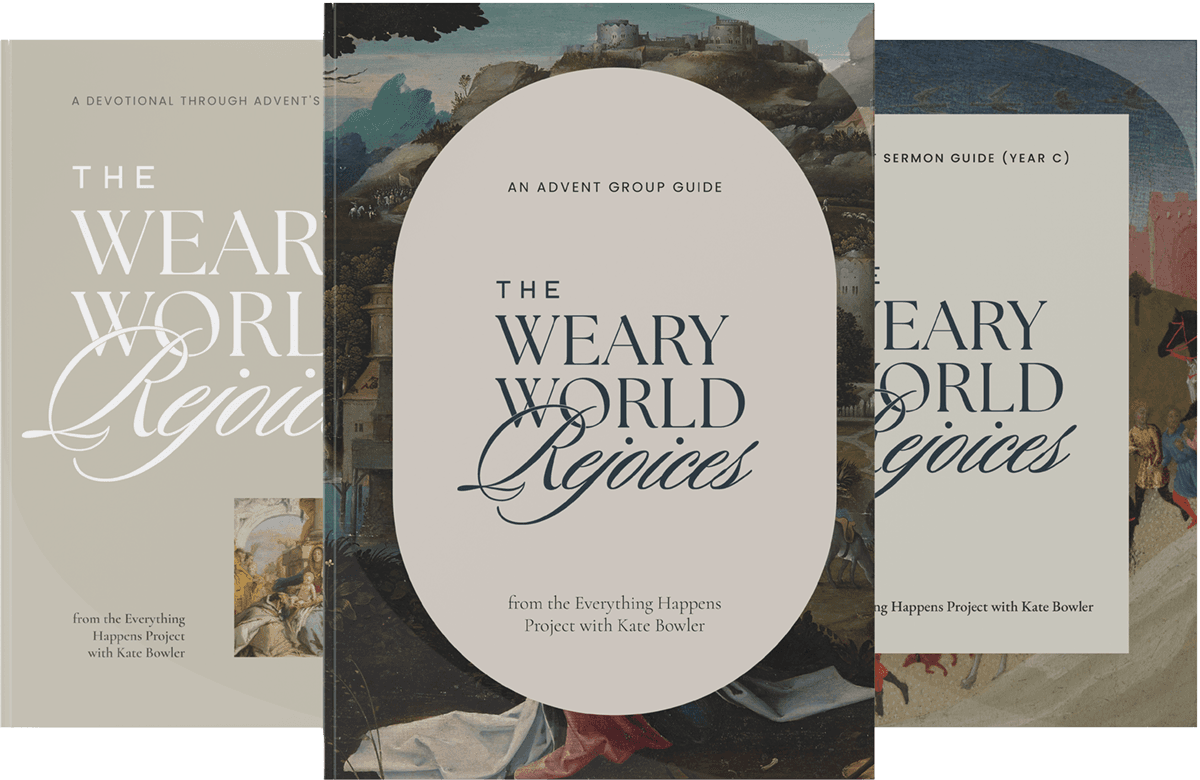
Leave a Reply